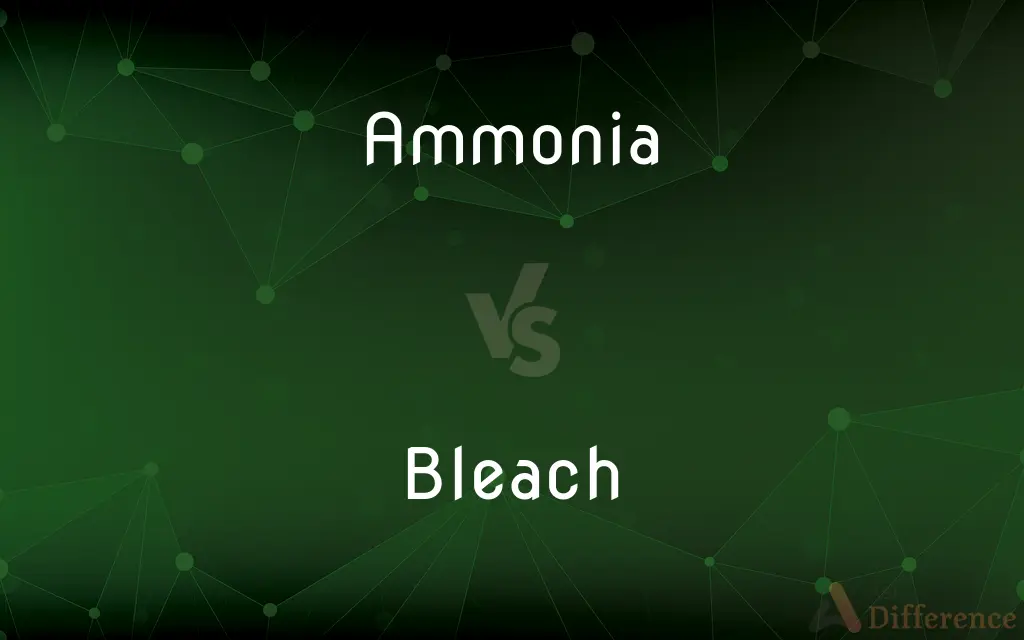Ammonia vs. Bleach — What's the Difference?
By Urooj Arif & Maham Liaqat — Updated on April 15, 2024
Ammonia is a mild alkali used mainly as a cleaner, while bleach is a strong disinfectant known for its ability to whiten and kill germs.

Difference Between Ammonia and Bleach
Table of Contents
ADVERTISEMENT
Key Differences
Ammonia, a compound of nitrogen and hydrogen, is commonly used in household cleaning products. Bleach, primarily consisting of sodium hypochlorite, is used for its potent disinfecting and whitening properties.
In terms of cleaning effectiveness, ammonia is great for cutting through grease, whereas bleach is more effective for removing stains and disinfecting surfaces due to its oxidative properties.
Ammonia emits a strong, pungent odor that can be irritating to the respiratory system, while bleach gives off a chlorine smell that can also be irritating and is hazardous if mixed with other cleaning agents, especially ammonia.
While ammonia can be used safely on a variety of surfaces without leaving a residue, bleach must be used with caution as it can discolor fabrics and damage surfaces over time.
In environmental terms, both chemicals need careful handling. Ammonia can contribute to the production of atmospheric particulates, whereas bleach can form toxic compounds if it enters water systems.
ADVERTISEMENT
Comparison Chart
Chemical Composition
Nitrogen and hydrogen (NH3)
Sodium hypochlorite (NaOCl)
Primary Use
Cleaning grease and glass
Disinfecting and whitening
Effectiveness
Good for grease, not a disinfectant
Excellent disinfectant, good for stains
Odor
Pungent, irritating
Strong, chlorine-like
Environmental Impact
Can contribute to air particulates
Can form toxic compounds in water systems
Compare with Definitions
Ammonia
A colorless gas with a pungent odor, soluble in water.
Ammonia is used in many household cleaners.
Bleach
Can damage fabrics and surfaces if used improperly.
Always dilute bleach to avoid damaging clothes.
Ammonia
Effective for cleaning glass and stainless steel.
Use ammonia to leave your windows streak-free.
Bleach
Releases chlorine gas, which can be toxic.
Never mix bleach with ammonia to avoid creating toxic gases.
Ammonia
Can be hazardous if inhaled in large amounts.
Ensure proper ventilation when using ammonia-based products.
Bleach
Widely used in water treatment processes.
Bleach helps to make drinking water safe by killing pathogens.
Ammonia
Does not leave streaks or residues.
Ammonia evaporates quickly, leaving surfaces clean.
Bleach
Has a shelf life and loses effectiveness over time.
Replace your bleach every few months to maintain its strength.
Ammonia
Commonly used in fertilizers.
Ammonia is an essential ingredient in nitrogen-rich fertilizers.
Bleach
A strong chemical used for disinfection and whitening.
Bleach is commonly used to sanitize bathrooms and kitchens.
Ammonia
Ammonia is a compound of nitrogen and hydrogen with the formula NH3. A stable binary hydride, and the simplest pnictogen hydride, ammonia is a colourless gas with a distinct characteristic of a pungent smell.
Bleach
Bleach is the generic name for any chemical product that is used industrially and domestically to remove color from a fabric or fiber or to clean or to remove stains in a process called bleaching. It often refers, specifically, to a dilute solution of sodium hypochlorite, also called "liquid bleach".
Ammonia
A colourless gas with a characteristic pungent smell, which dissolves in water to give a strongly alkaline solution.
Bleach
To remove the color from, as by means of chemical agents or sunlight
Over time, the exposure to sunlight bleached the rug in front of the window.
Ammonia
A colorless, pungent gas, NH3, extensively used to manufacture fertilizers and a wide variety of nitrogen-containing organic and inorganic chemicals. Ammonia is the chief nitrogen product excreted by fish and other aquatic animals.
Bleach
To make white or colorless
Dawn bleached the mountains.
Ammonia
See ammonium hydroxide.
Bleach
To act as or use a bleach.
Ammonia
(inorganic compound) A gaseous compound of hydrogen and nitrogen, NH3, with a pungent smell and taste.
Bleach
To become white as a result of the loss of algal symbionts, usually following an environmental stress such as increased water temperature. Used of coral.
Ammonia
A solution of this compound in water used domestically as a cleaning fluid.
Never use ammonia to clean metal writing pens.
Bleach
A chemical agent used for bleaching.
Ammonia
A gaseous compound of hydrogen and nitrogen, NH3, with a pungent smell and taste: - often called volatile alkali, and spirits of hartshorn.
Bleach
The act of bleaching.
Ammonia
A pungent gas compounded of nitrogen and hydrogen (NH3)
Bleach
The degree of bleaching obtained.
Ammonia
A water solution of ammonia
Bleach
(archaic) Pale; bleak.
Bleach
(transitive) To treat with bleach, especially so as to whiten (fabric, paper, etc.) or lighten (hair).
Bleach
(intransitive) To be whitened or lightened (by the sun, for example).
Bleach
To lose color due to stress-induced expulsion of symbiotic unicellular algae.
Once coral bleaching begins, corals tend to continue to bleach even if the stressor is removed.
Bleach
To make meaningless; to divest of meaning; to make empty.
Semantically bleached words that have become illocutionary particles
Bleach
(uncountable) A chemical, such as sodium hypochlorite or hydrogen peroxide, or a preparation of such a chemical, used for disinfecting or whitening.
Bleach
(countable) A variety of bleach.
Bleach
An act of bleaching; exposure to the sun.
Bleach
A disease of the skin.
Bleach
To make white, or whiter; to remove the color, or stains, from; to blanch; to whiten.
The destruction of the coloring matters attached to the bodies to be bleached is effected either by the action of the air and light, of chlorine, or of sulphurous acid.
Immortal liberty, whose look sublimeHath bleached the tyrant's cheek in every varying clime.
Bleach
To grow white or lose color; to whiten.
Bleach
The whiteness that results from removing the color from something;
A complete bleach usually requires several applications
Bleach
An agent that makes things white or colorless
Bleach
The act of whitening something by bleaching it (exposing it to sunlight or using a chemical bleaching agent)
Bleach
Remove color from;
The sun bleached the red shirt
Bleach
Make whiter or lighter;
Bleach the laundry
Common Curiosities
What is ammonia used for besides cleaning?
Ammonia is also used in the production of fertilizers and plastics.
How do I safely dispose of bleach?
Follow local guidelines for hazardous waste or dilute it with water before disposal.
What are the health risks of ammonia?
Exposure to high concentrations of ammonia can cause respiratory irritation and other health issues.
Can I mix ammonia with other cleaning agents?
Ammonia should never be mixed with bleach or certain detergents to avoid chemical reactions.
Is ammonia environmentally friendly?
While ammonia is not toxic to the environment, it can contribute to air pollution.
How should bleach be stored?
Store in a cool, dry place away from direct sunlight and heat.
How can bleach affect colored clothing?
Bleach can remove or lighten color, damaging the fabric.
What precautions should be taken when using ammonia?
Use in a well-ventilated area and avoid inhaling fumes.
Why is bleach considered more hazardous than ammonia?
Bleach can produce harmful gases if mixed with acids or ammonia and is more corrosive.
What is the shelf life of ammonia?
Ammonia does not degrade over time if stored properly.
What makes bleach a good disinfectant?
Bleach effectively kills bacteria, viruses, and fungi due to its strong oxidative effects.
Can ammonia be used in laundry?
Ammonia can be used as a laundry booster but should not be mixed with bleach.
Can I use ammonia on wooden surfaces?
Ammonia can damage wood finishes and should be used cautiously.
What are some alternatives to using bleach for disinfection?
Vinegar, hydrogen peroxide, and alcohol are alternatives, though less effective.
Why does bleach smell strongly of chlorine?
Bleach releases chlorine gas, which has a distinct strong odor.
Share Your Discovery

Previous Comparison
Message vs. Speech
Next Comparison
Blocklayer vs. BricklayerAuthor Spotlight
Written by
Urooj ArifUrooj is a skilled content writer at Ask Difference, known for her exceptional ability to simplify complex topics into engaging and informative content. With a passion for research and a flair for clear, concise writing, she consistently delivers articles that resonate with our diverse audience.
Co-written by
Maham Liaqat













































